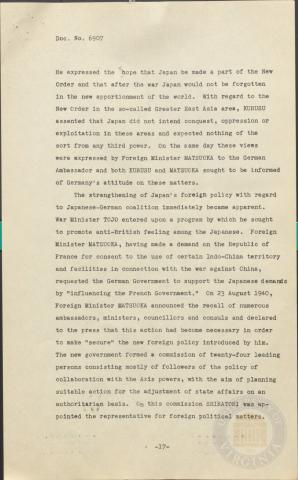
Page 17
| Parent | Doc. 6907 - Collaboration Between Japan, Germany and Italy, Volume 1 - Opening Statement |
|---|---|
| Date | |
| Language | English |
| Collection | Tavenner Papers & IMTFE Official Records |
| Box | Box 15 |
| Folder | Japan, Germany, Italy Collaboration Vol 1 |
| Repository | University of Virginia Law Library |
Doc. No. 6907
He expressed the hope that Japan be made a part of the New
Order and that after the war Japan would not be forgotten
in the new apportionment of the world. With regard to the
New Order in the so-called Greater East Asia area, KURUSU
assented that Japan did not Intend conquest, oppression or
exploitation in these areas and expected nothing of the
sort from any third power. On the same day these views
were expressed by Foreign Minister MATSUOKA to the German
Ambassador and both KURUSU and MATSUOKA sought to be informed
of Germany's attitude on these matters0
The strengthening of Japan1s foreign policy with regard
to Japanese-German coalition immediately became apparent.
War Minister TOJO entered upon a program by which he sought
to promote anti-British feeling among the Japanese. Foreign
Minister MATSUOKA, having made a demand on the Republic of
France for consent to the use of certain Indo-China territory
and facilities in connection with the war against China,
requested the German Government to support the Japanese demands
by "influencing the French Government." On 23 August 1940,
Foreign Minister MATSUOKA announced the recall of numerous
ambassadors, ministers, councillors and consuls and declared
to the press that this action had become necessary in order
to make "secure" the new foreign policy introduced by him.
The new government formed a commission of twenty-four leading
persons consisting mostly of followers of the policy of
collaboration with the Axis powers, with the aim of planning
suitable action for the adjustment of state affairs on an
authoritarian basis. On this commission SHIRATORI was ap- N * #
pointed the representative for foreign political matters.
